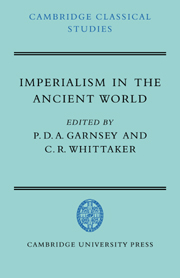Book contents
- Frontmatter
- Contents
- List of figures
- Preface
- 1 INTRODUCTION
- 2 IMPERIALISM AND EMPIRE IN NEW KINGDOM EGYPT
- 3 CARTHAGINIAN IMPERIALISM IN THE FIFTH AND FOURTH CENTURIES
- 4 SPARTAN IMPERIALISM?
- 5 THE FIFTH-CENTURY ATHENIAN EMPIRE: A BALANCE SHEET
- 6 ATHENS IN THE FOURTH CENTURY
- 7 THE ANTIGONIDS AND THE GREEK STATES, 276–196 B.C.
- 8 LAUS IMPERII
- 9 GREEK INTELLECTUALS AND THE ROMAN ARISTOCRACY IN THE FIRST CENTURY B.C.
- 10 THE BENEFICIAL IDEOLOGY
- 11 ROME's AFRICAN EMPIRE UNDER THE PRINCIPATE
- 12 JEWISH ATTITUDES TO THE ROMAN EMPIRE
- Notes
- Bibliography
- Index
11 - ROME's AFRICAN EMPIRE UNDER THE PRINCIPATE
Published online by Cambridge University Press: 05 June 2014
- Frontmatter
- Contents
- List of figures
- Preface
- 1 INTRODUCTION
- 2 IMPERIALISM AND EMPIRE IN NEW KINGDOM EGYPT
- 3 CARTHAGINIAN IMPERIALISM IN THE FIFTH AND FOURTH CENTURIES
- 4 SPARTAN IMPERIALISM?
- 5 THE FIFTH-CENTURY ATHENIAN EMPIRE: A BALANCE SHEET
- 6 ATHENS IN THE FOURTH CENTURY
- 7 THE ANTIGONIDS AND THE GREEK STATES, 276–196 B.C.
- 8 LAUS IMPERII
- 9 GREEK INTELLECTUALS AND THE ROMAN ARISTOCRACY IN THE FIRST CENTURY B.C.
- 10 THE BENEFICIAL IDEOLOGY
- 11 ROME's AFRICAN EMPIRE UNDER THE PRINCIPATE
- 12 JEWISH ATTITUDES TO THE ROMAN EMPIRE
- Notes
- Bibliography
- Index
Summary
With the inauguration of the Principate of Augustus, the history of Roman imperialism entered a new phase. Augustus' long reign was marked by conquest, pacification, colonization and administrative reorganization designed to secure the provinces and make possible their rational exploitation.
In this paper I analyse the character of Roman rule in North Africa in the period of the Principate and the nature of the society it produced. My original purpose was to assess the material benefits of Roman rule for provincials, and especially for Africans. This theme is not lost sight of here, but I have thought it necessary to set it against the background of the interests of the imperial power and the methods of Roman imperialism in Africa. Just as in the context of Roman social relations beneficia were given for services rendered, so the most tangible benefits received by subjects of Rome were granted in return for support of the imperialist enterprise. The main beneficiaries were those who cooperated in the work of pacification, political and social control, and economic exploitation.
How far the mass of Africans benefited from membership of Roman provincial society is uncertain. To the assertion that the basic beneficia, security and order, were enjoyed by all sections of African society, there is the rejoinder that the establishment of the pax Africana was accompanied by physical coercion, expropriation, and social dislocation; and that the continuation of peaceful conditions was contingent on the docility of an exploited peasantry. Whether or how far the rural population gained from the expansion of the economy is similarly a matter for dispute.
- Type
- Chapter
- Information
- Imperialism in the Ancient WorldThe Cambridge University Research Seminar in Ancient History, pp. 223 - 254Publisher: Cambridge University PressPrint publication year: 1979
- 17
- Cited by



